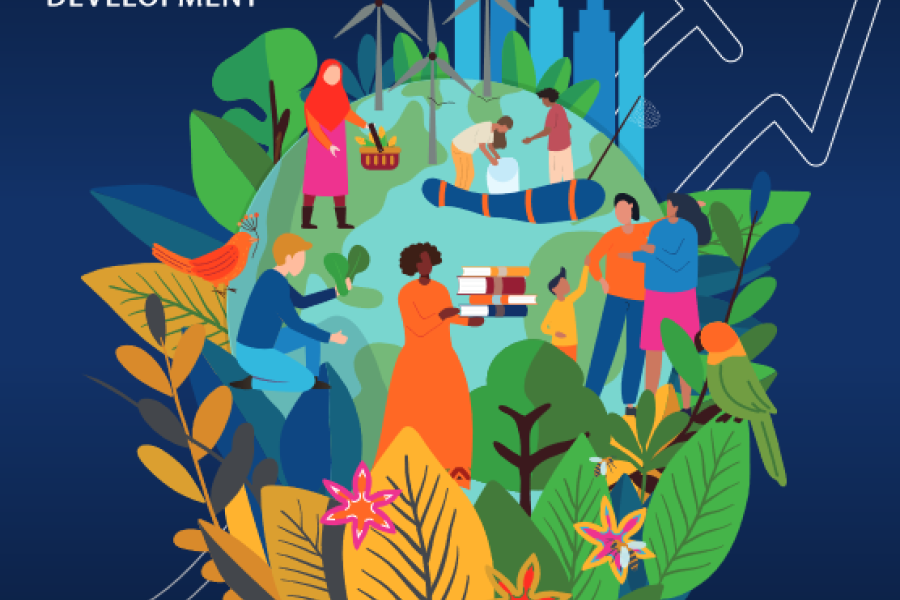From UPSC perspective, the following things are important :
Prelims level: Gross Domestic Product
Mains level: critique of the prevailing GDP-centric approach to economic development

Central Idea:
The central idea of the article is that traditional measures of economic growth, like GDP, are inadequate indicators of a nation’s well-being and development. Instead, the focus should shift towards inclusive and sustainable growth that prioritizes the welfare of citizens, particularly in countries like India where economic progress has not translated into improved living standards for all.
Key Highlights:
- Critique of GDP-centric approach: The article highlights the limitations of relying solely on GDP growth as a measure of economic health, pointing out that it doesn’t necessarily lead to increased income or well-being for citizens.
- Inequality and inequitable growth: Despite impressive GDP growth, India remains one of the most unequal countries in the world, indicating that the benefits of growth are not evenly distributed among its citizens.
- Need for a new paradigm: The article argues for a shift towards inclusive and environmentally sustainable development models, especially in the face of global challenges like climate change.
- Dependency on fossil fuels: The reliance on fossil fuels for essential materials like steel, concrete, plastics, and food production is highlighted, along with the challenges of transitioning away from them.
- Importance of local solutions: Emphasizing the significance of community-driven, local solutions, the article suggests that India should leverage its unique strengths rather than blindly following Western development models.
Key Challenges:
- Overcoming entrenched economic paradigms: Shifting away from GDP-centric models towards more inclusive and sustainable development approaches requires challenging existing economic frameworks and ideologies.
- Addressing inequality: Tackling the deep-rooted inequalities in India’s economy presents a significant challenge, especially given the historical focus on GDP growth.
- Transitioning from fossil fuels: Moving away from fossil fuel dependency poses technological, economic, and social challenges, particularly in sectors like agriculture and transportation.
- Balancing urbanization and rural development: Reconciling the push for urbanization with the need for rural development and sustainable agriculture presents complex policy dilemmas.
- Overcoming resistance to change: Convincing policymakers and society at large to embrace alternative development paradigms may face resistance from entrenched interests and ideologies.
Main Terms:
- GDP: Gross Domestic Product, a measure of the total value of goods and services produced within a country’s borders.
- Inclusive growth: Economic growth that benefits all segments of society, particularly the marginalized and vulnerable.
- Sustainable development: Development that meets the needs of the present without compromising the ability of future generations to meet their own needs.
- Fossil fuels: Non-renewable energy sources such as coal, oil, and natural gas, formed from the remains of prehistoric plants and animals.
- Urbanization: The process of population concentration in urban areas, often accompanied by industrialization and economic development.
Important Phrases:
- “Increase the size of the pie before its redistribution”: Reflects the emphasis on GDP growth over equitable distribution of wealth.
- “One path for all”: Criticizes the uniform approach to development that privileges industrialization and urbanization over other forms of progress.
- “Gandhian solution”: Refers to community-driven, localized approaches to development advocated by Mahatma Gandhi.
- “Rural Bharat”: Signifies the rural heartland of India, highlighting the importance of rural communities in the country’s development.
Quotes:
- “More GDP does not improve the well-being of citizens if it does not put more income in their pockets.”
- “India must find a new paradigm of progress, for itself and for the world, for more inclusive and environmentally sustainable growth.”
- “The time has come to go back to old solutions to go to the future.”
Useful Statements:
- “Critics argue that GDP growth alone does not necessarily lead to improved living standards for citizens, particularly in countries like India where inequality persists.”
- “Transitioning away from fossil fuels presents significant challenges, but it is essential for addressing climate change and ensuring long-term sustainability.”
- “Local, community-driven solutions have the potential to address global challenges like climate change and inequitable economic growth.”
Examples and References:
- The article cites India’s experience of impressive GDP growth alongside persistent inequality as evidence of the limitations of traditional development models.
- Reference is made to the work of Vaclav Smil on the role of fossil fuels in modern economies, providing a scientific basis for understanding the challenges of transitioning to renewable energy sources.
Facts and Data:
- India’s GDP grew at 7.2% per year during both the United Progressive Alliance and National Democratic Alliance governments, yet structural conditions leading to inequitable growth remained unchanged.
- Sixty-four per cent of Indian citizens live in rural areas, highlighting the importance of rural development in India’s economic and social progress.
Critical Analysis:
The article provides a compelling critique of the prevailing GDP-centric approach to economic development, highlighting its failure to address inequality and environmental concerns. By advocating for inclusive and sustainable growth models, the article offers a nuanced perspective on the challenges facing countries like India in the 21st century. However, it could benefit from further exploration of specific policy recommendations and case studies demonstrating successful alternative development strategies.
Way Forward:
- Embrace inclusive and sustainable development models that prioritize the well-being of all citizens.
- Invest in renewable energy sources and sustainable agriculture to reduce dependency on fossil fuels and mitigate climate change.
- Empower local communities to drive development initiatives tailored to their unique needs and challenges.
- Reform economic policies to prioritize equitable distribution of wealth and opportunities.
- Foster international cooperation to address global challenges like climate change and inequality.
Get an IAS/IPS ranker as your 1: 1 personal mentor for UPSC 2024
